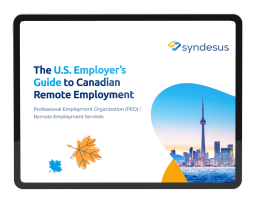Major US-based companies, particularly tech companies, are expanding into Canada and opening or greatly expanding their offices.
The growing trend can be attributed to a number of factors, including the complicated and lengthy H-1B visa application process in the US, making it difficult to hire and retain tech talent, and the relatively straightforward immigration programs and strong social benefits in Canada.
Though it is easy to assume that a company needs to be of a certain size before expanding internationally, it’s actually easier to do than many companies think. Smaller US companies might want to benefit from this as well, but how? Instead of opening up an entire office, which can be expensive and time-consuming, there are other options.
Two services that can help both small and mid-size US companies expand internationally are an Employer of Record (EOR) and a Professional Employer Organization (PEO). These services help ensure compliance with local employment laws, manage tax, payroll, and benefits, plus even supports or handles the immigration process if it’s needed.
But PEOs and EORs are sometimes used interchangeably even though the two have some important differences. This article will explain each of their functions and the key differences between the two so you can make the right choice for your company.
PEO vs EOR: How are they different?
When a business finds they need to work with a third-party employment partner — either a PEO or an EOR — they need to make sure they choose the right one for their company.
A PEO requires the company to already have an established entity in Canada.
Though they perform many similar services, there are key differences that can put a company at legal risk if they choose the wrong option. We’re going to focus this article on PEOs and EORs in Canada, though do note that the information here generally relates to PEOs and EORs around the world.
A PEO requires the company to already have an established entity in Canada. Thus, the PEO steps in to handle all the HR, legal, tax, and other operational tasks needed for a legal entity already in existence.
On the other hand, an EOR provides most, if not all, of the same services that a PEO offers but does not require the company to operate a legal entity in Canada — indeed, the EOR’s most important role is to actually be the legal employer within the country and thus take responsibility for hiring and terminating employees.
Key differences between a PEO and an EOR
In the event that your company does not have a legal presence in Canada (or, as previously stated, anywhere in the world) and you want to hire employees locally, then hiring through an EOR is a much more efficient and cost-effective option than opening up an office abroad.
An EOR is an ideal option for smaller businesses that aren’t ready to expand or companies that only want to hire a few staff abroad. An EOR allows you to seamlessly hire and retain staff in countries where you’re not registered as a business. Full operational administration and liability of the employee lie with the EOR.
A PEO can also support the hiring and firing of employees, but the liability of the employee remains with the company, and, as mentioned above, the company needs to have a legal presence there.
But the EOR will be the local employer of the workers in Canada from a legal and liability standpoint, rather than the US company.
Thus, for companies that already have a presence in Canada, but require support with some of the technical aspects of employment, a PEO can provide several benefits to small and mid-size companies within a co-employment arrangement.
A PEO and EOR can both take care of HR services such as tax filing, payroll processing, performing background checks, and handling employee benefits. But the EOR will be the local employer of the workers in Canada from a legal and liability standpoint, rather than the US company.
If a company does eventually decide to create its own legal entity and wants to transition off of the Canadian EOR, an EOR can help the US company in setting up its Canadian legal entity, transitioning away from the EOR, and providing ongoing PEO support moving forward.
Syndesus can provide you with both EOR and PEO services in Canada
Syndesus can help you with both PEO and EOR services including immigration, benefits, HR, and payroll. Administrative processes are taken care of for you while you focus on expanding your workforce and moving your company forward.
We can help US companies that don’t have an office in Canada leverage Canada’s tech talent and favorable immigration laws for tech workers, whether those companies are small US startups or large corporations. Or, if you already have a Canadian entity, Syndesus can manage the technical aspects of employment and help grow and maintain your team.
Reach out to us to learn more about how we can help you.




